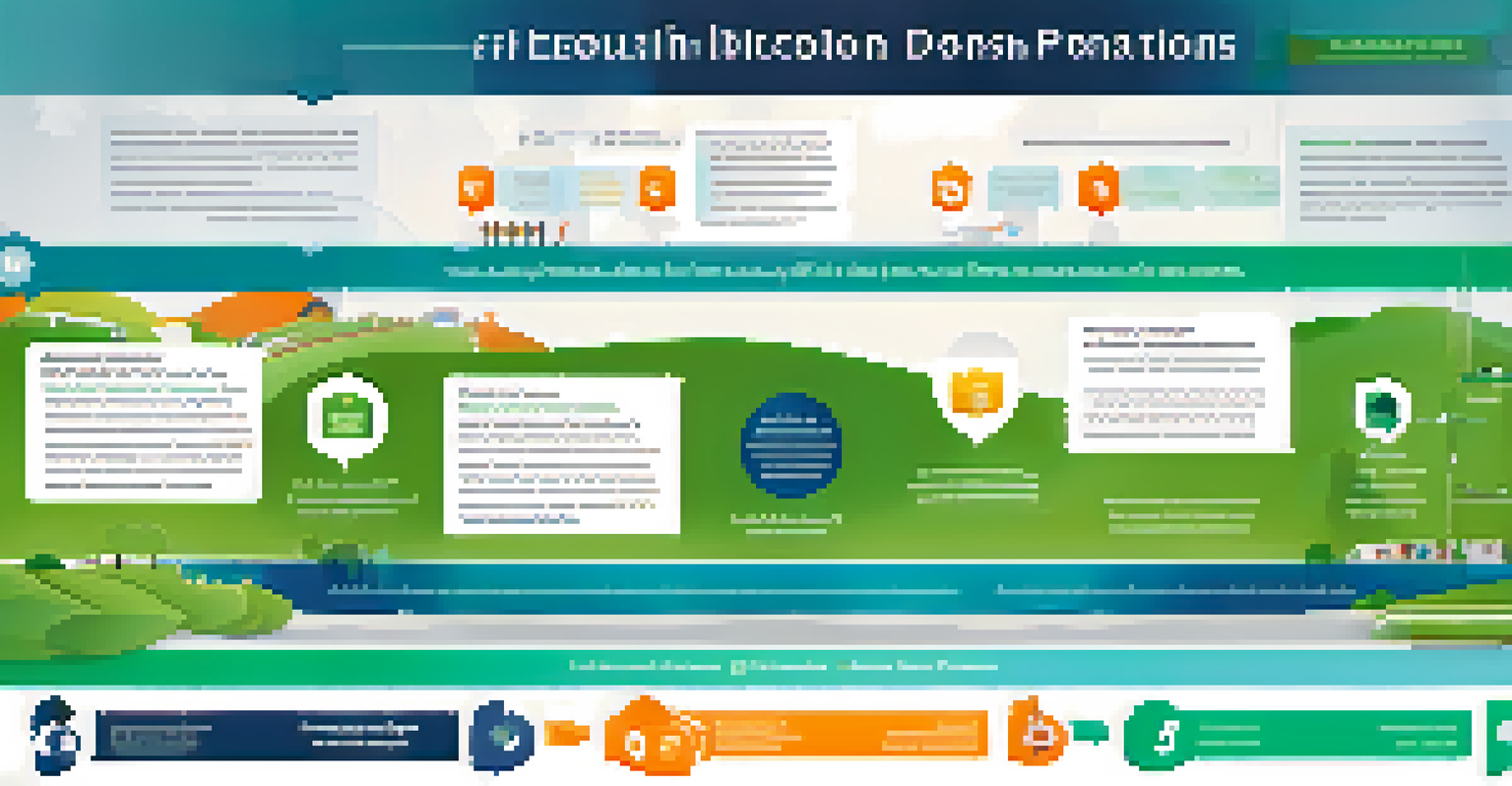Promoting Educational Initiatives with Bitcoin Donations

Understanding Bitcoin: A Brief Overview for Educators
Bitcoin is a decentralized digital currency that operates without a central authority. It allows users to send and receive payments directly, making it an innovative tool for fundraising. This technology can be particularly beneficial for educational initiatives seeking to diversify their funding sources.
Bitcoin is a technological tour de force.
For educators and institutions unfamiliar with cryptocurrency, think of Bitcoin as a new kind of dollar, but one that exists only online. It can be bought, sold, or exchanged for goods and services, just like traditional currencies. Understanding its basics is crucial for harnessing its potential in promoting educational causes.
With an increasing number of people becoming interested in Bitcoin, integrating it into fundraising efforts can attract a new demographic of donors. This shift not only opens up new avenues for support but also engages tech-savvy supporters eager to contribute to meaningful causes like education.
The Benefits of Accepting Bitcoin Donations
One of the significant advantages of accepting Bitcoin donations is the lower transaction fees compared to traditional payment methods. This means more of the funds go directly to the educational initiatives rather than being consumed by processing fees. This efficiency can make a substantial difference, especially for smaller organizations.

Additionally, Bitcoin donations are often processed more quickly than traditional bank transfers. This immediacy can be crucial for educational projects that require timely funding, whether for new materials, scholarships, or urgent repairs. Faster access to funds empowers educators and institutions to act swiftly on their needs.
Bitcoin Boosts Educational Funding
Accepting Bitcoin donations can diversify funding sources for educational initiatives, attracting tech-savvy supporters.
Moreover, accepting Bitcoin can enhance the visibility and credibility of educational initiatives. By embracing modern technology, organizations can position themselves as forward-thinking and adaptable—qualities that resonate with today's donors, particularly younger generations who are more inclined to support tech-driven solutions.
How to Set Up Bitcoin Donations for Your Initiative
Setting up a system to accept Bitcoin donations is easier than many might think. Various platforms and payment processors specialize in cryptocurrency, offering user-friendly solutions. Organizations can choose a service that aligns with their needs, making the process accessible even for those without technical expertise.
The future of money is digital currency.
Once a platform is selected, organizations can create a Bitcoin wallet, which is essentially a digital bank account for holding the currency. This wallet will allow them to receive donations and manage their funds securely. Many wallets also provide easy-to-follow guides, ensuring that even the least tech-savvy individuals can navigate the setup.
Promoting the option of Bitcoin donations is just as vital as setting it up. By incorporating information about this new donation method into existing fundraising campaigns, organizations can reach potential donors who prefer using cryptocurrency. Clear communication about how donations work will help build trust and encourage participation.
Engaging Donors Through Educational Campaigns
To successfully promote Bitcoin donations, educational initiatives should create campaigns that educate potential donors about the benefits of cryptocurrency. This could include webinars, informational blog posts, or social media content explaining how Bitcoin works and its positive impact on education.
Storytelling is a powerful tool in this context. Sharing success stories that highlight the impact of previous donations—whether in the form of scholarships, facility upgrades, or community projects—can resonate with potential donors. Connecting Bitcoin donations to tangible results encourages more people to participate.
Quick and Cost-Effective Donations
Bitcoin donations often come with lower transaction fees and quicker processing times, allowing more funds to reach educational projects promptly.
Moreover, offering incentives for Bitcoin donors can increase engagement. This could range from exclusive updates on how their funds are used to recognition on the organization’s website. By making donors feel valued and appreciated, educational initiatives can foster a community of supporters motivated to contribute.
Addressing Concerns: Security and Legitimacy
As with any new technology, concerns about security and legitimacy arise when discussing Bitcoin donations. It's essential for educational initiatives to address these concerns transparently. Providing information on how donations are secured and the measures taken to protect users can help build trust among potential donors.
Bitcoin transactions are recorded on a public ledger called the blockchain, which adds a layer of transparency. This means that while donor identities can be kept private, the transactions themselves are traceable. Sharing this information can reassure donors that their contributions are being handled responsibly.
Additionally, it’s important for organizations to keep abreast of legal and regulatory requirements regarding cryptocurrency. By demonstrating compliance and commitment to ethical practices, educational initiatives can further enhance their credibility in the eyes of potential donors.
The Role of Community in Promoting Bitcoin Donations
Building a supportive community around educational initiatives is crucial for promoting Bitcoin donations. Encouraging current donors and supporters to spread the word can amplify the message and reach new audiences. Word-of-mouth can be a powerful tool, especially in niche circles interested in cryptocurrency.
Engaging with local businesses or tech clubs can also help foster a community of support. These partnerships can lead to collaborative events or initiatives that raise awareness about both education and Bitcoin donations. By working together, organizations can create a sense of shared purpose and broaden their reach.
Building Trust Through Transparency
Addressing security concerns and providing clear information about Bitcoin transactions can enhance donor trust in educational initiatives.
Social media platforms offer an excellent venue for community engagement. Regular updates, behind-the-scenes looks at funded projects, and donor spotlights can create a buzz. Encouraging conversations around Bitcoin donations can lead to stronger connections and a more invested community.
Future Perspectives: The Growing Role of Cryptocurrency in Education
As cryptocurrency continues to gain traction, its role in educational funding will likely expand. Many institutions are already exploring ways to integrate Bitcoin into their financial strategies, signaling a shift in how educational initiatives are financed. This trend represents an exciting opportunity for educators to rethink funding approaches.
With the rise of digital currencies, younger generations are becoming more involved in philanthropy through innovative methods. Organizations that adapt to these changes by embracing cryptocurrency will likely attract a new wave of donors eager to support educational initiatives in ways that resonate with their values and habits.

Ultimately, the integration of Bitcoin donations into educational initiatives reflects a broader trend towards modernization and innovation in fundraising. By staying ahead of the curve, educators can ensure that they continue to benefit from diverse funding sources, paving the way for more robust and sustainable educational programs.